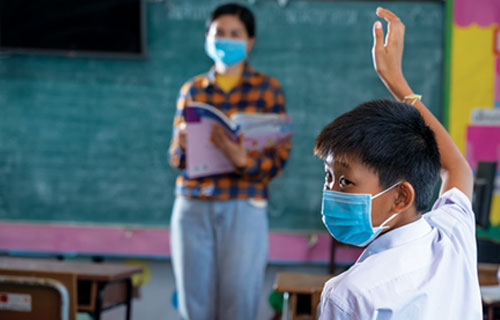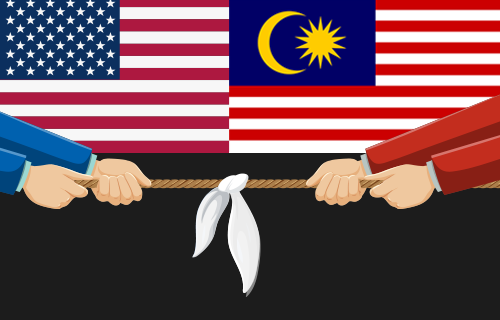IDEAS and UNICEF: Refugee and asylum-seeking children’s rights to education and healthcare must be protected now

Kuala Lumpur, 29 September 2022 – The Institute for Democracy and Economic Affairs (IDEAS) Malaysia and the United Nations Children’s Fund (UNICEF) Malaysia, supported by the European Union, launched the report titled “Left Far Behind: The Impact of COVID-19 on Access to Education and Healthcare for Refugee and Asylum-seeking Children in Peninsular Malaysia.” This report assesses the impacts of COVID-19 on refugee and asylum-seeking children’s access to education and healthcare in Malaysia and identifies evidence-based solutions to address them, based on quantitative surveys and qualitative interviews with teachers, parents, adolescents, and healthcare workers from various states across Peninsular Malaysia.
More than 25% of refugees and asylum-seekers registered with UNHCR in Malaysia are children below the age of 18. This means that some 47,200 children have limited or no access to formal education, healthcare and other essential services due to their lack of legal status, making them one of the most vulnerable groups to the impact of the COVID-19 pandemic.
“The right to education and healthcare are two of the most fundamental rights of a child under the United Nations Convention on the Rights of the Child,” said Ms. Saskia Blume, Chief of Child Protection, UNICEF Malaysia. “While Malaysia begins to recover from the pandemic, the situation of refugee and asylum-seeking children has only deteriorated. The impacts of COVID-19, if not addressed urgently, are likely to continue bringing long-term harm to their lives.”
“Now more than ever, a child’s status should not be a barrier to accessing essential services. All children deserve opportunities to learn and grow,” said Ms. Virpi Kukkasniemi-Leino, Counsellor, Delegation of the European Union to Malaysia. “The European Union is proud to support this important and timely publication as part of our cross-regional Protecting children affected by migration in Southeast, South and Central Asia, co-funded by the European Union and UNICEF.”
Even before the pandemic, refugee and asylum-seeking children had no access to formal education, leaving them with access only to informal education through alternative learning centres (ALCs), which itself comes with various challenges. According to UNHCR, only 44% of refugee children in Malaysia are enrolled in primary education, and 16% of refugee youth are enrolled in secondary education.
This report highlighted that many pre-existing barriers to education faced by refugee and asylum-seeking children had worsened during the pandemic. These barriers include poverty, lack of awareness of the importance of education, geographical barriers, and limited financial resources faced by ALCs. Refugees and asylum-seekers do not have the legal right to work and poverty was identified as the most significant barrier, reflecting the loss of livelihood opportunities during COVID-19. The lack of legal protection and rise of xenophobia experienced by the refugee community also further impacted access to education during the pandemic. The lack of legal documentation, financial needs and certification issues also limited opportunities for academic progression to higher education.
Refugees and asylum-seekers also faced significant barriers in accessing affordable healthcare prior to the pandemic. While refugees and asylum-seekers have access to NGO health facilities for primary healthcare, their complex social and healthcare needs as well as the lack of legal framework on asylum issues pose barriers to accessing affordable secondary healthcare and emergency care.
This report highlighted that poor hygiene conditions, low parental health literacy, malnutrition, and delayed presentation to healthcare services were the main causes of morbidity that have significantly worsened during the pandemic. Health needs related to mental health, child protection, and sexual and gender-based violence also increased after the lifting of the Movement Control Order. The lack of an enabling environment and socio-cultural barriers such as lack of inclusive policies, rise in xenophobia, fear of arrest and detention, and lack of state support services for child protection all hindered access to health care during COVID-19. The loss of employment during the pandemic further exacerbated cost-related barriers in accessing healthcare.
While the study highlighted that many barriers to education and healthcare were exacerbated by the pandemic, it also noted new opportunities that emerged for refugee and asylum-seeking children to access education and healthcare services through online modalities, digital tools and new partnerships and engagement. The report lists concrete recommendations to address the identified barriers and leverage on new opportunities, drawn from refugees and asylum-seekers themselves, as well as teachers and healthcare workers that support them.
Dr Tricia Yeoh, Chief Executive Officer of IDEAS Malaysia stated, “As we move out of the COVID-19 pandemic, the fundamental human rights issues faced by refugees and asylum-seekers, such as accessing formal education and healthcare, remain critical and urgent. In order for long-term systemic change to occur, we need to start including refugee and asylum-seeking children in national policies that protect and uphold their rights to education and healthcare.”
IDEAS and UNICEF would like to thank the refugee community, specifically the children, parents, teachers as well as healthcare workers for sharing their stories, challenges and opinions in this research. IDEAS and UNICEF welcomes the support of various government, non-government and private stakeholders in taking forward the report’s recommendations and in future collaborative research.
The report as well as an audiobook of the key findings in Rohingya language can be found on the IDEAS website.
— END —
Download Media Statement PDF File Here
For enquiries, please contact:
Kirjane Ngu, Research Executive, Social Policy Unit, IDEAS Malaysia
T: +603 2070 8881/8882 | E: kirjane@ideas.org.my
Louis Denis, Manager, External Relations, IDEAS Malaysia,
T: +603 2070 8881/8882 | E: louis@ideas.org.my
Rachel Choong, Communication Officer (Media), UNICEF Malaysia,
T: +603 2070 8881/8882 | E: rchoong@unicef.org
About UNICEF
UNICEF works in some of the world’s toughest places, to reach the world’s most disadvantaged children. Across 190 countries and territories, we work for every child, everywhere, to build a better world for everyone. For more information about UNICEF and its work for children visit https://www.unicef.org/malaysia/. Follow UNICEF on Twitter, Instagram and Facebook.

